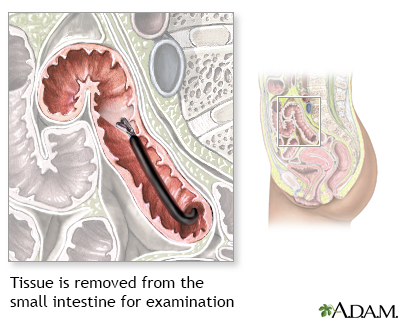Small bowel tissue smear/biopsy
Small bowel tissue smear is a lab test that checks for disease in a sample of tissue from the small intestine.
Images

I Would Like to Learn About:
How the Test is Performed
A sample of tissue from the small intestine is removed during a procedure called esophagogastroduodenoscopy (EGD) or another procedure called enteroscopy. A brushing of the intestine lining can also be taken.
The sample is sent to a laboratory. There it is sliced, stained, and placed on a microscope slide to be examined.
How to Prepare for the Test
You will need to have an EGD or enteroscopy procedure for the sample to be taken. Prepare for this procedure in the way your health care provider recommends.
How the Test will Feel
You are not involved in the test once the sample is taken.
Why the Test is Performed
Your provider may order this test to look for an infection or other disease of the small intestine. In most cases, this test is done only when a diagnosis could not be made using stool and blood tests.
Normal Results
A normal result means that there were no indicators of disease when the sample was examined under the microscope.
The small intestine normally contains certain healthy bacteria and yeast. Their presence is not a sign of disease.
Normal value ranges may vary slightly among different laboratories. Talk to your provider about the meaning of your specific test results.
What Abnormal Results Mean
An abnormal result means that certain microorganisms, such as the parasites giardia or strongyloides were seen in the tissue sample. It may also mean that there were changes in the structure (anatomy) of the tissue.
The biopsy may also reveal evidence of celiac disease, Whipple disease or Crohn disease.
Risks
There are no risks associated with a laboratory culture. The risks of the EGD or enteroscopy procedure include:
- Bleeding
- Perforation of (poking a hole in) the gastrointestinal tract by the scope
- Infection
Some people may not be able to have this test because of other medical conditions.
Related Information
String testGiardia infection
References
Bush LM, Levison ME. Peritonitis and intraperitoneal abscesses. In: Bennett JE, Dolin R, Blaser MJ, eds. Mandell, Douglas, and Bennett's Principles and Practice of Infectious Diseases. 9th ed. Philadelphia, PA: Elsevier; 2020:chap 74.
Mathison BA, Pritt BS. Medical parasitology. In: McPherson RA, Pincus MR, eds. Henry's Clinical Diagnosis and Management by Laboratory Methods. 24th ed. Philadelphia, PA: Elsevier; 2022:chap 63.
Ramakrishna BS. Tropical diarrhea and malabsorption. In: Feldman M, Friedman LS, Brandt LJ, eds. Sleisenger and Fordtran's Gastrointestinal and Liver Disease. 11th ed. Philadelphia, PA: Elsevier; 2021:chap 108.
Siddiqi HA, Rabinowitz S, Axiotis CA. Laboratory diagnosis of gastrointestinal and pancreatic disorders. In: McPherson RA, Pincus MR, eds. Henry's Clinical Diagnosis and Management by Laboratory Methods. 24th ed. Philadelphia, PA: Elsevier; 2022:chap 23.
BACK TO TOPReview Date: 5/6/2022
Reviewed By: Michael M. Phillips, MD, Emeritus Professor of Medicine, The George Washington University School of Medicine, Washington, DC. Also reviewed by David C. Dugdale, MD, Medical Director, Brenda Conaway, Editorial Director, and the A.D.A.M. Editorial team.

Health Content Provider
06/01/2025
|
A.D.A.M., Inc. is accredited by URAC, for Health Content Provider (www.urac.org). URAC's accreditation program is an independent audit to verify that A.D.A.M. follows rigorous standards of quality and accountability. A.D.A.M. is among the first to achieve this important distinction for online health information and services. Learn more about A.D.A.M.'s editorial policy, editorial process and privacy policy. A.D.A.M. is also a founding member of Hi-Ethics. This site complied with the HONcode standard for trustworthy health information from 1995 to 2022, after which HON (Health On the Net, a not-for-profit organization that promoted transparent and reliable health information online) was discontinued. |
The information provided herein should not be used during any medical emergency or for the diagnosis or treatment of any medical condition. A licensed medical professional should be consulted for diagnosis and treatment of any and all medical conditions. Links to other sites are provided for information only -- they do not constitute endorsements of those other sites. © 1997- 2024 A.D.A.M., a business unit of Ebix, Inc. Any duplication or distribution of the information contained herein is strictly prohibited.
